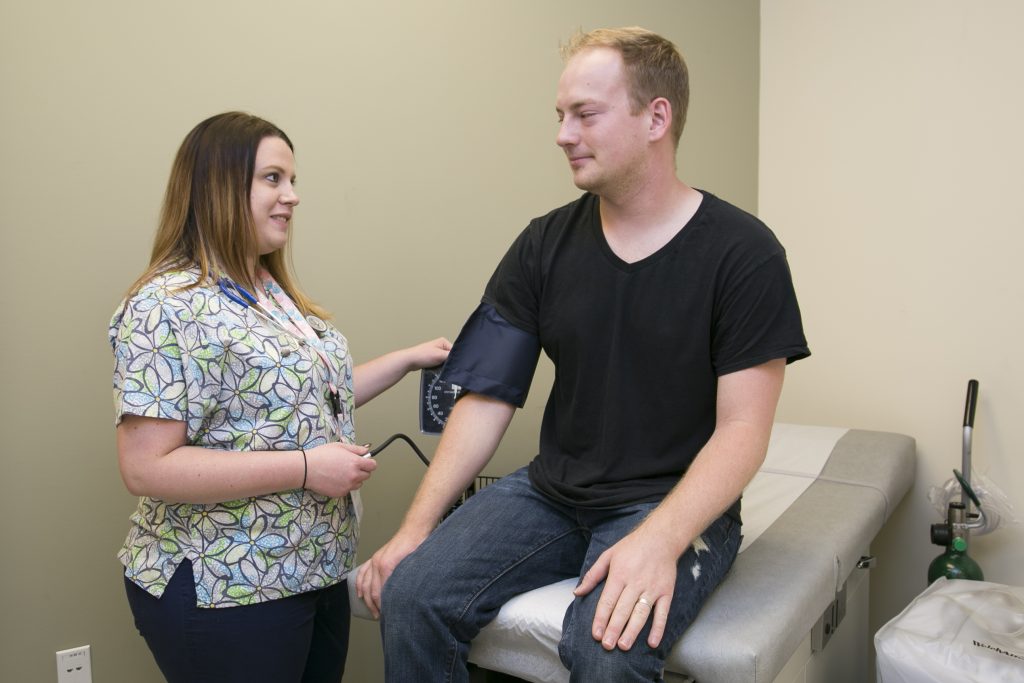Alcohol Detox at Home: Risks and Tips

By The Recovery Village Columbus
Last Updated: February 16, 2023
Detoxing from alcohol at home can be dangerous, so people are typically advised to seek medical detox services when quitting alcohol. However, there are some cases when a person may be able to safely detox from alcohol on their own. Those who want to stop alcohol use at home and have been cleared by a doctor to do so may find it more relaxing and comfortable to detox in their home environment instead of at a medical facility. Ultimately, an at-home alcohol detox should only be done with the permission of a doctor.
What Is Alcohol Withdrawal?
Alcohol withdrawal is a set of symptoms that occur when someone uses alcohol heavily or for a prolonged period of time and then stops. These symptoms happen because the brain adjusts to the presence of alcohol and is forced to readjust when alcohol is stopped. This readjustment period creates unpleasant withdrawal symptoms.
Alcohol Withdrawal Symptoms
Alcohol withdrawal symptoms can range from unpleasant to deadly. When it is severe, alcohol withdrawal is actually one of the most dangerous forms of substance withdrawal someone can experience.
Minor alcohol withdrawal symptoms include:
- Anxiety
- Depression
- Fatigue
- Loss of appetite
- Clammy skin
- Headache
- Mood swings
- Jumpiness
- Nausea and vomiting
- Nightmares
- Insomnia
Severe alcohol withdrawal symptoms include:
- Tremors
- Hallucinations
- Delirium
- Seizures
- Fever
- Severe agitation
What Is Alcohol Detox?
The idea of alcohol detox goes hand in hand with withdrawal, but they each differ slightly. Detox refers to the process of allowing the body to naturally eliminate alcohol and return to a normal state, while withdrawal refers to the changes and symptoms that occur during detox.
How Long Does It Take To Detox From Alcohol?
The timeline for alcohol detox can vary depending on how heavily alcohol has been used. Alcohol withdrawal symptoms will normally begin within 12 to 24 hours, peak within 48 to 72 hours and subside within seven to 10 days.
Is It Safe to Detox From Alcohol at Home?
It is not safe to detox from alcohol at home unless your situation has been evaluated by a doctor and the doctor says it is safe. Alcohol withdrawal can cause seizures and a dangerous condition called delirium tremens. Either of these could be fatal, and only a doctor can determine if you are at risk for dangerous complications of alcohol withdrawal.
Pros and Cons of At-Home Alcohol Detox
While alcohol detox at home should only be attempted with a doctor’s permission, it may be a good choice for those who can safely do it. Some of the pros of an at-home alcohol detox include:
- Detoxing in a more comfortable environment
- Greater freedom to engage in activities
- Ease of socializing with others during detox
- Lower cost than detoxing in a medical facility
Cons of at-home alcohol detox include:
- Greater danger of complications from severe symptoms
- Greater risk of discomfort without access to medical help
- Higher risk of relapse or unsuccessful detox due to easy access to alcohol
- Harder to quickly access help if necessary
Risks of Detoxing From Home
Detoxing at home, especially when done without a doctor’s permission, carries significant risks. If serious detox symptoms do develop, detoxing at home can delay how quickly you receive treatment. If you are detoxing at home, you are also more likely to be alone and unable to get yourself the help you need if things do become serious.
Even in situations where detox is not dangerous, a lack of medical support can make the process much more uncomfortable. Combined with easier access to alcohol, this can increase the risk of ending detox early and starting to use alcohol again. People who detox with medical help are more likely to successfully complete the process than those who detox at home.
What To Expect When Detoxing From Alcohol at Home
When detoxing at home, you should expect alcohol withdrawal symptoms to begin within 12 to 24 hours after your last drink. Initial symptoms may include restlessness and a headache, but they will progress into nausea, vomiting, anxiety and insomnia.
Alcohol withdrawal symptoms will gradually intensify until they peak around 48 to 72 hours after your last drink. During the peak of symptoms, the likelihood of severe complications is the highest. It is also when a person in withdrawal will be most tempted to resume drinking and end the detox.
After the peak of withdrawal symptoms, the symptoms will gradually begin to decline. This process will occur slower than the onset of the symptoms, but the physical symptoms will disappear one by one. Psychological symptoms like depression, anxiety and cravings may persist for several weeks or longer.
How To Safely Detox from Alcohol at Home
The most important consideration for safely detoxing at home is to check with a doctor first. Only a doctor can determine who can safely undergo an at-home detox. Some other tips for safely detoxing at home include:
- Have someone with you during the entire detox
- Know the symptoms of severe alcohol withdrawal before beginning
- Have a plan in case withdrawal symptoms become dangerous
- Ensure no alcohol is present in the house
- Clear your schedule during the detox
What To Avoid When Detoxing
When detoxing, there are some things that you should avoid to ensure that you have the safest and most successful experience possible:
- Being alone
- Having alcohol accessible
- Idle, unoccupied time
- People who you often drink with
- Triggers for drinking, such as activities that you normally do while drinking
- Stressful situations
By avoiding these things, you can increase your chances of successfully completing detox on your own.
How To Manage Alcohol Withdrawal Symptoms at Home
The best way to manage alcohol withdrawal symptoms is with medications. Withdrawal symptoms occur because of chemical changes in the brain, and only medications will truly relieve them. Other methods of managing symptoms primarily involve distracting you from them.
Ideally, when you check with your doctor to see if it is safe to detox at home, they will give you prescriptions for medications to help with symptoms and instructions on how to use them. In addition to using prescribed medications, you can also try distraction techniques. The best distraction techniques will be different for everyone, but activities like doing yoga, building a puzzle, watching a movie or even just talking with a friend can be helpful. In severe cases, however, medical supervision will be necessary to treat symptoms and avoid a potential relapse.
Benefits of Detoxing From Alcohol in a Medically Supervised Setting
When detoxing in a medically supervised setting, you will have access to medical support and be monitored by trained professionals who will quickly recognize complications if they develop. These specialists also have the experience and training needed to optimize your detox experience.
During a medically supervised alcohol detox, your care team will be able to quickly recognize symptoms you are experiencing and treat them through a combination of medications and therapies. They will also know effective strategies that can help you get through difficult symptoms as you experience them.
Alcohol Detox Treatment Options
While some people may choose to detox from alcohol at home without any medical help, this is not recommended due to the potential dangers of alcohol withdrawal. A person should only complete an at-home detox if permitted by a doctor.
Professional alcohol detox treatment programs will usually include either an outpatient or an inpatient option. Outpatient alcohol detox involves checking in with a doctor during detox but not actually staying in a medical facility. This is like detoxing at home, but medical support is still being provided through regular doctor visits. Inpatient detox involves staying in a detox facility and having 24/7 care throughout the detox process.
Finding an Alcohol Detox Clinic in Ohio
The Recovery Village Columbus is one of Ohio’s leading alcohol detox facilities. Our state-of-the-art facility offers both inpatient and outpatient detox, as well as high-quality rehab treatment programs that help maintain the gains made during detox.
Our combination of compassionate care and individualized treatment is designed to give you the best chance of achieving lasting freedom from the effects of alcohol addiction. If you or someone you love is struggling with alcohol addiction, contact us today to learn more about how we can help you begin the journey to a healthier, alcohol-free life.
Top Reads About Alcohol Addiction

How Long Does Alcohol Stay In your System?
The time it takes for alcohol to have an effect depends on a variety of factors and will be… Read More

Alcohol Addiction Treatment in Ohio
If you can’t seem to stop drinking, you’re not alone. Let our experts help you heal… Read More

Am I an Alcoholic?
Knowing the signs of alcohol addiction can help you identify whether you or a loved one may be at… Read More

Does Alcohol Affect the Kidneys?
Alcohol causes dehydration, which decreases blood flow to the kidneys and makes it more difficult… Read More

Understanding Alcoholism and Finding Resources for Alcohol Addiction
This resource guide is an overview of the information currently available on alcohol use and abuse… Read More
Sources
- National Organization for Rare Disorders. “NIH GARD Information: Acute alcohol sensitivity.” 2021. Accessed June 7, 2022.
- Cleveland Clinic. “Alcohol Intolerance.” August 24, 2020. Accessed June 7, 2022.
- Bryant, Andrew J. & Newman, John H. “Alcohol intolerance associated with Hodgkin lymphoma.” Canadian Medical Association Journal. May 14, 2013. Accessed June 7, 2022.
- Lea, Georgia. “Could a glass of wine diagnose long COVID?” KevinMD.com. March 12, 2021. Accessed June 7, 2022.
- YorkTest. “Alcohol Intolerance.” 2022. Accessed June 7, 2022.
- OMICS International. “Alcohol Intolerance.” 2022. Accessed June 7, 2022.
- Australasian Society of Clinical Immunology and Allergy. “Alcohol Allergy.” 2019. Accessed June 7, 2022.
- Soghoian, Samara. “Disulfiram Toxicity.” Medscape. May 16, 2022. Accessed June 7, 2022.

Questions?
Our Recovery Advocates are ready to answer your questions about addiction treatment and help you start your recovery.





